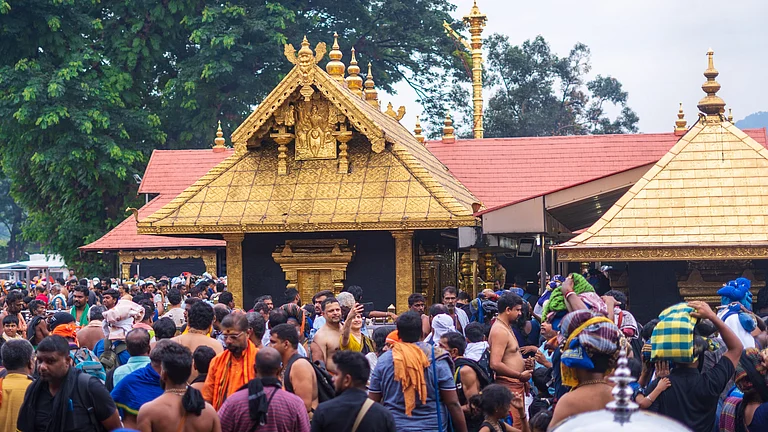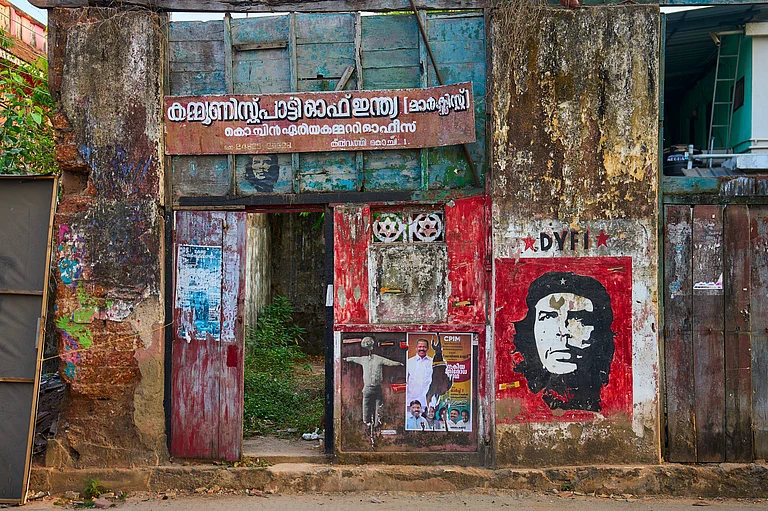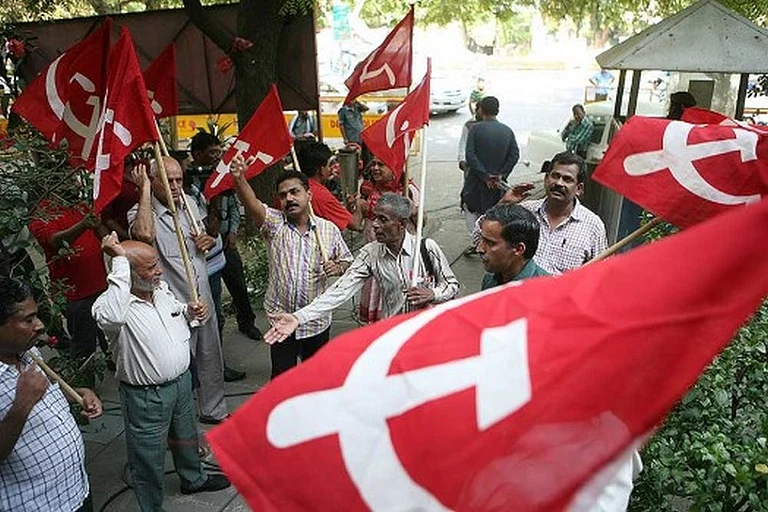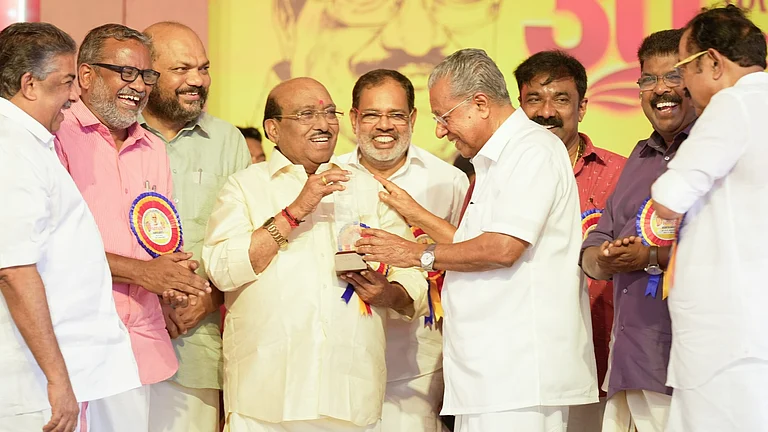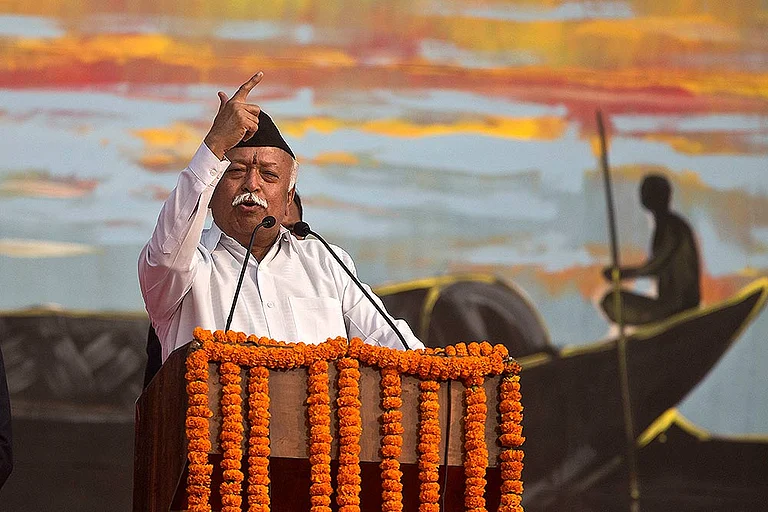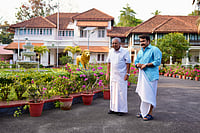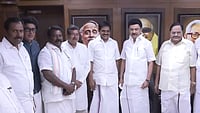
CPI(M)’s changing stance on Sabarimala women’s entry stirs political storm.
As caste bodies, including Nair Service Society, rally behind Ayyappa Summit, Dalits and progressives voice opposition.
Critics say policy shift and Ayyappa Summit are aimed at Hindu voters.
In September 2018, the Supreme Court delivered a historic majority judgement, declaring that the exclusion of women of menstruating age from entering the Sabarimala temple was unconstitutional and a violation of their fundamental rights. The ruling cut sharply through Kerala’s social fabric, creating a deep divide.
On one side stood the reformists, backed firmly by the Left government under the Chief Minister of Kerala, Pinarayi Vijayan, who welcomed the verdict as a step towards equality. On the other side, powerful caste organisations like the Nair Service Society (NSS), along with Hindutva groups, rose in defiance, launching agitations against what they saw as an affront to tradition and faith. Congress, the opposition party in the state at the time, reflected the conservative position, and its cadres took part in the agitation led by Hindutva forces, while some leaders, who had a different opinion, largely maintained tacit silence.
Pinarayi Vijayan personally took charge of the campaign, pushing the reformist agenda with unusual force. At a series of public meetings, he made it clear that the Left’s stance was rooted in principle, not expediency. “The Left’s position on social reforms is not dictated by vote-bank politics. Kerala has achieved social progress only by resisting anti-human, ritualistic practices,” he declared, insisting that the Supreme Court’s judgment had to be implemented in its true spirit.
Cut to 2025. The same Pinarayi Vijayan is now at the helm of a very different campaign. His government is busy organising the Lord Ayyappa Summit, assuring stakeholders that rituals and traditions will be safeguarded. Yet, much like in 2018, the move has split Kerala society—though along very different lines.
Those who had raged against the Supreme Court verdict, unleashing violent strikes across the state, now find themselves aligned with the government. Meanwhile, progressive voices—Dalit organisations, civil society groups, and scholars who once stood shoulder to shoulder with the Left—are accusing it of a volte-face, of abandoning its reformist stance and yielding to Hindutva pressures.
“Of course, the Kerala government or the Devaswom Board, which administers temples, can convene an Ayyappa summit. But the real question is—who gets invited, and what will actually be discussed?” asked Dr T T Sreekumar, author and professor at the School of Interdisciplinary Studies, English and Foreign Languages University, Hyderabad.
He said that the Sabarimala deity does not strictly belong to the Hindu pantheon, nor can the temple historically be considered exclusive to the Hindus. “It has always had a more secular character and, in fact, originally belonged to the Malayarayans, a tribal community. The summit should ideally deliberate with devotees on how the temple can be restored for the Malayarayans. The authorities could also explore how the Supreme Court's verdict on women’s entry can be meaningfully implemented. And since the issue revolves around Lord Ayyappa, the summit, by its very nature, ought to be multi-religious,” he added.
However, both the government and the Devaswom Board have made it clear that the summit will prioritise customs and rituals. Officials and Devaswom minister, V N Vasavan, have indicated that controversial figures will not be invited,and polarising issues—such as the Supreme Court’s verdict on women’s entry—will be kept off the table.
The CPI(M)’s aggressive push for the reformist agenda in Sabarimala soon after the Supreme Court verdict on women’s entry came at a steep political price. Despite organising large-scale mobilisations such as the women’s wall—stretching across 600 km of the state—and vocally confronting conservative opposition, the party faced heavy setbacks in the 2019 Lok Sabha election. The Left Democratic Front (LDF) managed to win just one of Kerala’s 20 seats, with the CPI(M) itself drawing a blank, while the Congress-led United Democratic Front (UDF) swept 19 constituencies.
Although the BJP failed to convert the Sabarimala agitation into parliamentary seats, its vote share rose to around 13 per cent in 2019, up from 10.5 per cent in 2014, signalling a consolidation of Hindu conservative sentiment behind itself. This trend, according to a CPI(M) insider, forced the party leadership to temper its reformist rhetoric and recalibrate its political line. What was once framed as a battle against “anti-human rituals” has since been rebranded in the language of consensus and sensitivity (to beliefs). The 2025 Ayyappa Summit captures this shift, marking a strategic departure from the CPI(M)’s earlier insistence on fully implementing the Supreme Court verdict.
“The CPI(M)’s stance smacks of sheer opportunism,” said C P John of the Communist Marxist Party, a constituent of the Congress-led United Democratic Front (UDF). “We are not boycotting the summit. But the government must clarify whether it intends to revise its position on women’s entry, and whether it will withdraw the cases filed against thousands of people who had agitated against allowing women into the temple.”
While the CPI(M) leadership insists that the issue of women’s entry into Sabarimala is a “closed chapter,” the Travancore Devaswom Board has not entirely ruled out submitting a revised affidavit before the Supreme Court. According to them, it is a non-political event.
The CPI(M) has also defended the upcoming summit as a non-political event, organised merely to mark the platinum jubilee of the Devaswom Board. Yet the political writing on the wall is clear: the party sees appeasing conservative sections and caste-based organisations as the pragmatic route to regaining Hindu support.
“A large section of the Muslim community’s perception of the CPI(M) has shifted, despite its pro-minority stance. The party now needs to win back Hindu voters. The Ayyappa summit is part of that strategy, aimed at a wider Hindu society. The support the CPI(M) has managed to draw from organisations like the NSS and SNDP could disrupt the electoral equations of both the BJP and the Congress,” a party insider revealed. SNDP is the Sree Narayana Dharma Paripalana, which represents the interests of the primarily Ezhava caste group, both socially and, indirectly, in the political sphere as well.
Devaswom Board President P S Prasanth said the convention will be a gathering of thousands of Ayyappa devotees. “The support extended by the community groups is encouraging,” he said.
Meanwhile, Sangh Parivar outfits have announced a parallel summit of Ayyappa devotees, with reports suggesting that leaders such as Amit Shah, the Union Home Minister, may attend, potentially turning Sabarimala into contested political ground once again.
“The Ayyappa Summit is nothing but an attempt to placate Brahmanical Hindu groups for political gain,” argued Dr T S Syam Kumar, Sanskrit scholar and activist. “Those who changed their stance on Sabarimala, and assured Hindutva minority groups that all customs would be protected, are changing themselves into Hindutva politics, which will have dangerous consequences for Kerala society,” he added.
Not many are surprised by the CPI(M)’s pragmatic shift. Historian and social critic Dr J Devika argues that the party has never been consistent in its stance, tailoring words and deeds to electoral needs.
“Even in 2018, after the Supreme Court verdict, while the CPI(M) made all the right noises about reforms and renaissance, the then Devaswom Minister Kadakampally Surendran was unequivocal in saying that only ‘true bhakts’ would be allowed into the temple. So I am not surprised by their stand now,” she told Outlook.
While the CPI(M) retained power in Kerala in 2021, largely on the strength of its handling of the COVID-19 pandemic and the floods of 2018 and 2019, the party has since realised that its core vote bank—particularly within the Ezhava community—is steadily drifting towards the BJP. This erosion was evident in the last Lok Sabha election, where the BJP made inroads into traditional CPI(M) strongholds.
The Ayyappa Summit, then, is a calculated gamble to reclaim Hindu voters. But with political rhetoric around Sabarimala intensifying, the UDF and BJP sharpening their attacks, and progressive groups openly questioning the summit, the eventual fallout of “Sabarimala 2.0” remains unpredictable.








